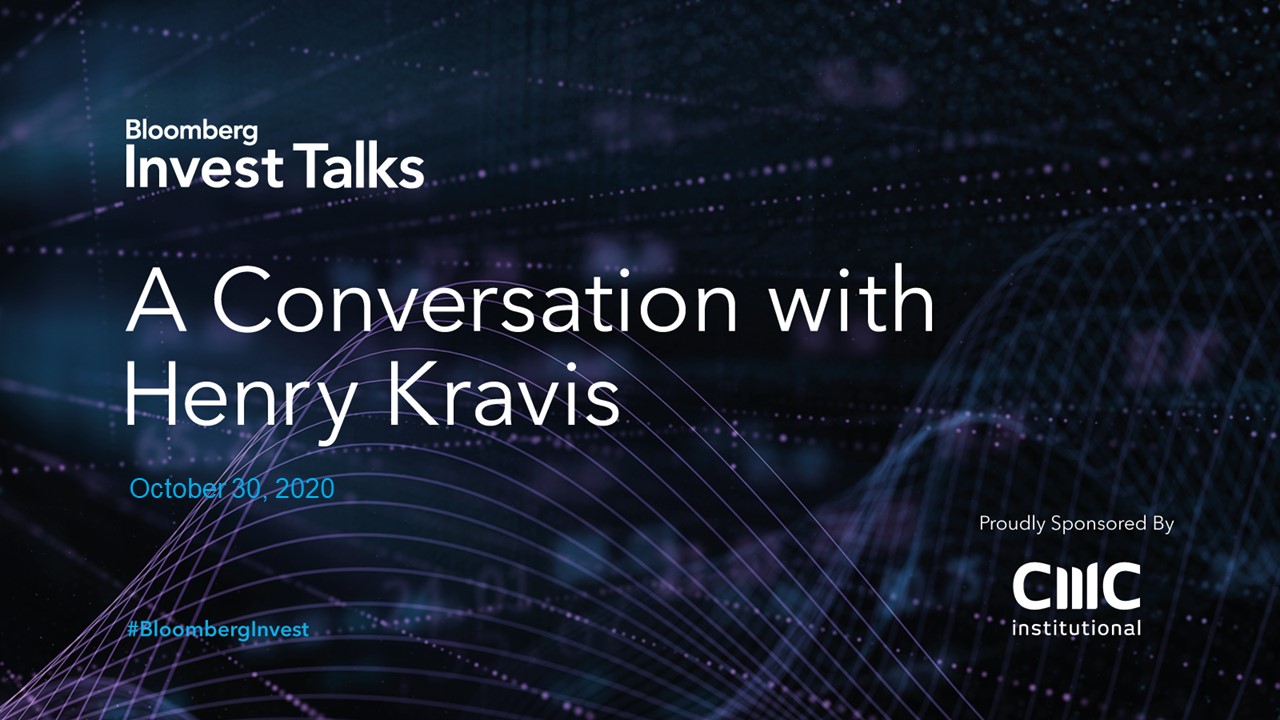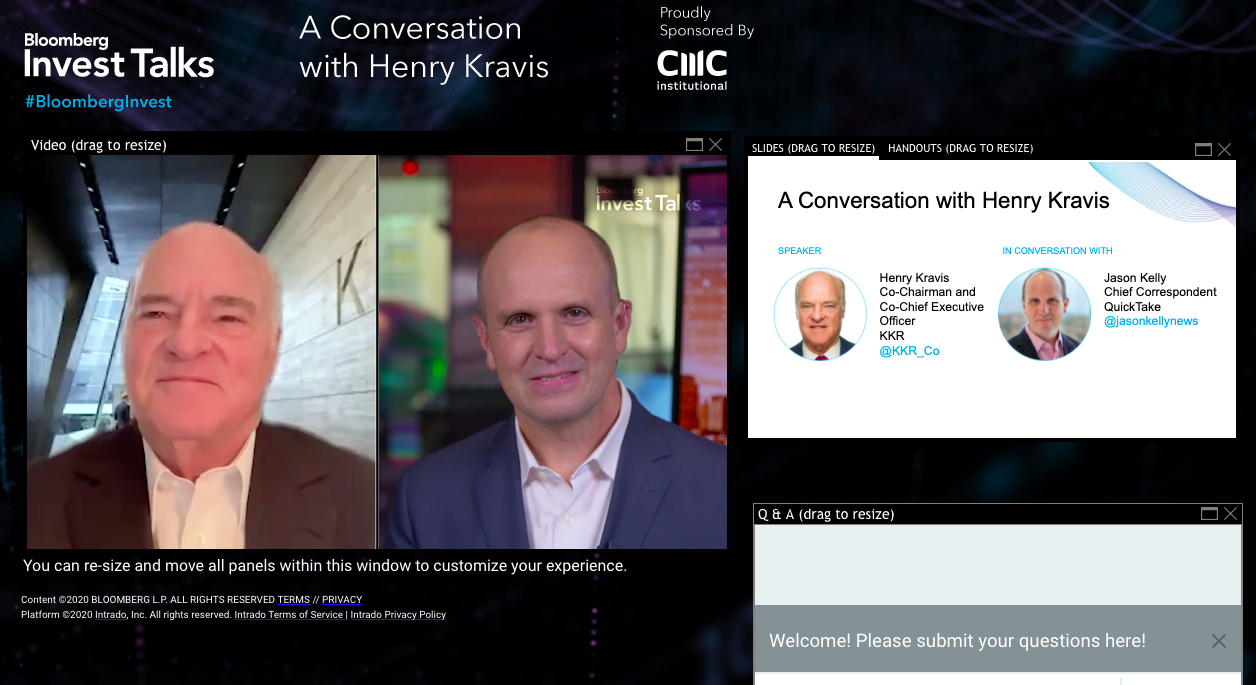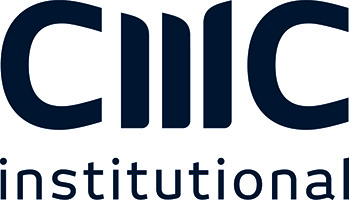By Marie Sylvestre, Bloomberg Live
On October 30th, the latest segment of the Bloomberg Invest Talks series kicked off with Jason Kelly, Chief Correspondent, Bloomberg QuickTake, sitting down with Henry Kravis, Co-Chairman and Co-CEO, KKR, for a virtual one-on-one discussion about the global economy, the potential impact of the upcoming U.S. presidential election, the effects of the Covid pandemic, diversity and more.
- Henry Kravis, Co-Chairman and Co-CEO, KKR
- Jason Kelly, Chief Correspondent, Bloomberg QuickTake
Click here to view video of the full discussion.

A few of the key takeaways:
State of the world
When asked about the state of the world, Kravis called it “upside down.” He elaborated by sharing his perspective about the current global health and economic crises. “The global pandemic has taken many lives, unfortunately, and, today, it still threatens the lives of millions of people around the world. We went through a lull and it looked like things were better. And, now we’re back into the teeth of it again as cases are spiking tremendously.”
He expanded on his thoughts, saying, “Thank goodness that Congress, Treasury and the Federal Reserve in the U.S. and other central banks and governments around the world have put an enormous amount of money into the system to make sure that the economies of the various countries didn’t collapse.” He talked about the market’s extreme volatility and said, “Just look at our markets in the U.S. We’re up, one day, three, four hundred points and then the next day, for almost no reason, we’re down four to five hundred points. Any news coming out of the pharmaceutical industry on progress with a therapeutic or with a vaccine is changing sympathy in the markets. If you have a test going and all of a sudden somebody becomes ill and it doesn’t work, they have to slow down the testing that they’re doing. All of a sudden, markets react.” He said “I don’t remember a time when I’ve seen such volatility as we see today.”
Keeping busy
During the Covid outbreak, KKR’s U.S. offices shut down in March and left Kravis wondering: “How are we going to even keep busy? Will we have much of a year at all?” To that end, he said, “we have had probably the busiest year and productive year that we’ve had almost ever. I think it’s really in part because of the culture that we have at the firm that has held the firm together, the glue. And it didn’t matter whether we’re operating from a standpoint of Zoom calls, telephone calls or in the office. It’s that culture of helping each other and working together. And, as a result of that, we’ve been able to invest over 40 billion dollars so far this year across our various products that we have. Had you asked me that in March, ‘Do you think that’s possible?’ I would’ve said absolutely not.”
Culture at KKR
“We wanted a culture where everyone participated in absolutely everything we did. Whether you worked on a transaction or you didn’t, whether you were based in San Francisco, where George was, or in New York, where Jerry and I were, whether you were a partner at the firm or you weren’t a partner at the firm, you got to participate in everything that we did.” He further elaborated by saying, “We talk about that culture all the time. That’s our DNA. That is the one thing that keeps us together and keeps us able to grow and help each other significantly.”
Selling assets
Kravis said, “We’ve sold a number of our assets this year. What surprised me is I thought that as we got closer to an election and the possibility of a change in capital gains rates at some point next year that there would be more people that would be driven by the capital gains rate. They’re driven by that in part but that’s not their highest priority. They’re saying, we’ll sell at the right price, at the time that we think is the right time to sell. And so it’s not necessarily tax-driven today.” That said, “the market took off. Once the Federal Reserve started pumping money and increased their balance sheet by trillions of dollars, all of a sudden spreads tightened, capital was available and the market started moving up and up and up. And, as a result, prices went up significantly from where they had them.”

Where you put money to work
KKR entered the Asia market with an objective “to become the leading private equity firm in Asia all the way from Japan down to Australia to Korea, Hong Kong, China, Southeast Asia and India. Today, our business in India is a very broad business. It encompasses infrastructure. It encompasses real estate. It encompasses credit, growth equity and private equity. And, we have a very good credit business out there now.” Kravis talked about their ability to look at different products and underscored their desire “to become a solutions provider for companies in addition to being an investor.”
Election
In the 44 years that KKR and 50+ years that Kravis have been investing in private equity, he and his team have experienced different cycles that have included high interest rates that were off the charts back in 1978 and 1979, deflation and the global financial crisis in 2008 and 2009. During the current downturn, he said KKR was “prepared for something to happen” but “didn’t know what it was going to be.” Kravis recalled, “When Covid hit in the U.S., we had gone about 125, 126 months of uninterrupted GDP growth.” That was the “longest period since 1900 that we’ve seen in growth in the GDP.” That said, Kravis affirms that whether Vice President Biden or President Trump wins the election, KKR will continue to find opportunities. “We just have to make sure our companies are extremely well-positioned for whatever may be coming down the road.”
Diversity
When speaking about diversity, Kravis says, “This is an extremely high priority today for all of us. And I will say over and over again, it starts at the top.” He underscores that “if the CEOs don’t work toward building a diverse and inclusive culture and group of employees, you’re missing out.” He emphasizes the importance of having “diversity of ethnicity, gender and thought” and further explains that “coming from the same backgrounds, you’re not gonna have much of a firm if you do that.” Kravis offered some insights into KKR’s efforts to foster more diversity within their environment. He said, “We’re doing everything from focusing on supply chain management at our different companies to make sure that minority suppliers are included just like everybody else. We are focused very much on trying to ensure that our boards of directors of our portfolio companies have at least two diverse directors. And I’m happy to say that we’ve hired over 100, today, diverse people, diverse backgrounds as directors and our companies particularly in the U.S.” He also shared, “We are teaming up with organizations like FCO and Harlem Capital, which is a minority-owned private equity firm to see where we can be helpful in hiring more of these students from college that are coming out and want to get into the workforce.”
Philanthropy
Kravis said, “Philanthropy to me is a very personal decision.” About 30 years ago, philanthropist David Rockefeller gave him some great advice by telling him “whatever you do, Henry, get involved. ‘He said, don’t just write a check. He said, sure there’ll be those organizations where a friend of yours is asking you to make a donation and you’ll do that. But pick a few organizations that mean a lot to you and get involved. Yes, you’re going to write the check but give them your best thinking.’ And it’s exactly what I’ve done.” Kravis said, “It’s probably one of the most enjoyable things that I’ve ever done in watching people, particularly an underserved community, say you’ve made a difference in my life.”
This Bloomberg Invest Talks was Proudly Sponsored By

——————————
Join the Conversation: #InvestTalks
Instagram: @BloombergLive
LinkedIn: Bloomberg Live
Twitter: @BloombergLive
Interested in more Bloomberg Live virtual events? Sign up here to get alerts.
——————————